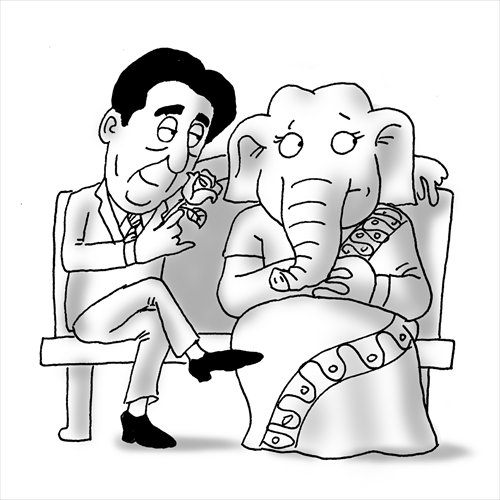Tokyo’s pursuit of New Delhi may stumble

Illustration: Liu Rui/GT
Japanese Prime Minister Shinzo Abe embarks on an official trip to India Friday. The two sides are expected to expand and deepen cooperation in defense, nuclear energy, infrastructure and so forth. Tokyo and New Delhi have become increasingly closer in recent years.
Annual summits between top leaders of both sides have been carried out for years since Japanese former prime minister Junichiro Koizumi's visit to India in April 2005. Although Tokyo regards its ties with New Delhi highly, the bilateral trade volume remains relatively low. Hoping to strengthen economic contacts with New Delhi, the Japanese government has been encouraging domestic private sectors and large-scale enterprises to invest in India for a long time. Yet the progress has been slow. By visiting New Delhi, Abe may hope to boost Japan's economic ties with its southern Asian friend.
During his trip, Abe is anticipated to speed up the cooperation with his Indian counterpart Narendra Modi on large-scale national infrastructure projects. It is highly likely that Tokyo will offer generous terms to New Delhi. Japan is advantageous in exporting its high-speed railway technology. The two leaders are expected to discuss the possible introduction of Japan's Shinkansen train technology to India during this trip, and defense-related equipment exports.
From a strategic perspective, China is an essential factor behind the closer Japan-India relationship. Tokyo is trying to contain and besiege Beijing by every possible means, and Abe will not miss any chance to draw Modi over to his side to counter China. In October, the Japanese Maritime Self-Defense Force has joined the Malabar naval exercise.
On the other hand, New Delhi is quite cautious in handling its relations with Beijing and Tokyo. The Indian government has no intention to take sides between China and Japan, aware that setting itself against Beijing will bring no good to New Delhi.
India is hoping to hitchhike on China's rise to obtain more economic benefits, and thus is unwilling to offend the world's second largest economy. Knowing that China-Japan relationship is far from perfect, the Indian government is cautious in developing its ties with Tokyo, so as to leave itself some leeway in handling its relations with Beijing.
The Indian government prioritizes economic development over the need to balance and contain China's rise. By cooperating with Japan, the nation looks forward to reaping more profits from Japanese enterprises. Given its high expectations toward investments from both Japan and China, New Delhi is attempting to strike a balance between the two countries.
Although Beijing-New Delhi relationship will not be influenced by Abe's India visit, it has to be pointed out that the India-launched Malabar naval drill has seriously cast a shadow to the regional security and stability. The India-launched anti-submarine drill was most likely targeting China. New Delhi, annoyed by Beijing's presence in surrounding areas, invited Tokyo to the drill as a counter measure.
Although the likelihood of India turning hostile against China remains quite low, the two nations still suffer from misunderstanding and distrust. While the Indian government may regard Beijing's presence in its surrounding waters as provocative, the Chinese side is also dissatisfied and annoyed by the naval drill. Given this, the two sides should talk more.
Nonetheless, there is no need for China to be too concerned about a closer India-Japan relationship. The annual summits between the top Indian and Japanese leaders have been carried out for years. Yet, Beijing is highly concerned if New Delhi-Tokyo cooperation poses a threat to the regional peace and stability. Beijing share many common interests and divergences with New Delhi. The two sides need to communicate more in the future.
The author is director of Center for Asia-Pacific Studies, Shanghai Institutes for International Studies. opinion@globaltimes.com.cn